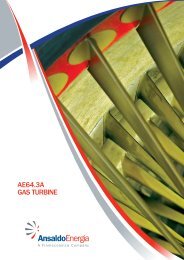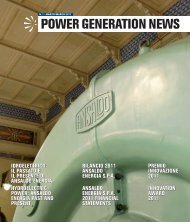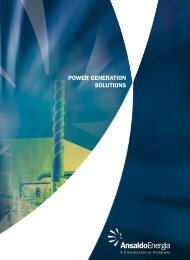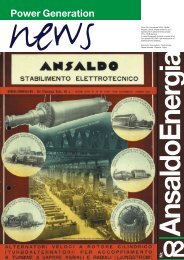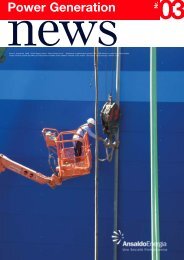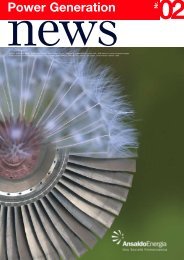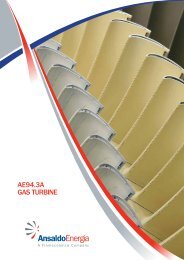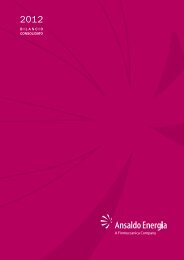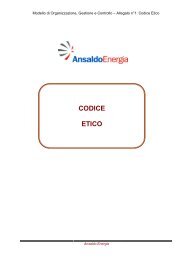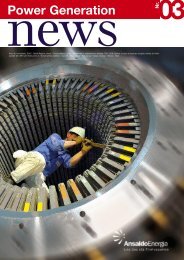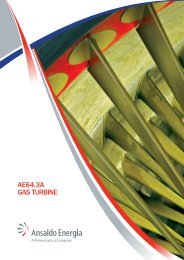Power generation N.1
Power generation N.1
Power generation N.1
You also want an ePaper? Increase the reach of your titles
YUMPU automatically turns print PDFs into web optimized ePapers that Google loves.
Energy<br />
&<br />
news<br />
<strong>Power</strong> Generation<br />
news<br />
The lack of a European<br />
energy policy<br />
The crisis triggered by the dispute<br />
between Russia and Ukraine on<br />
the price of gas marks a new era<br />
of geopolitics in the European<br />
energy market.<br />
Close linkage between energy<br />
security and external security in<br />
Italy reveals dramatically how<br />
much we depend for energy on<br />
third countries in politically<br />
unstable regions of the world.<br />
This dependence is set to<br />
increase unless we find solutions<br />
that radically modify our habits<br />
and diversify energy sources<br />
significantly.<br />
Italy has a vested interest in the<br />
debate about energy supply<br />
security, because its policy in the<br />
sector has gradually brought<br />
about an almost total<br />
dependence on imports. The<br />
European commission is now<br />
starting to take steps to highlight<br />
how a competitive energy market<br />
can contribute to growth and<br />
development by containing prices<br />
and improving sourcing security.<br />
Enel in Italy and abroad<br />
Enel is constantly on the move<br />
both in Italy and internationally.<br />
As is demonstrated by the official<br />
opening of the new hydroelectric<br />
power station at the dam on the<br />
Piave river near Busche di<br />
Cesiomaggiore (Belluno).<br />
The plant, which is equipped with<br />
a Kaplan bulb turbine rated 1,200<br />
kW and a synchronous 6,000 V<br />
alternator, is connected to the<br />
20,000 V grid through a transformer<br />
and a buried transmission line.<br />
The average nominal output<br />
stands at 850 kW, equivalent to<br />
total annual production of about<br />
6,000,000 kWh.<br />
In Slovakia, Enel Managing<br />
Director Fulvio Conti and the<br />
Slovak Minister of the Economy<br />
Jirko Malcharek signed the definitive<br />
contract for the acquisition by<br />
Enel of 66% of Slovenske<br />
Elektrarne (SE), the largest acquisition<br />
ever made by the Italian group<br />
abroad.<br />
SE is the leading producer of electricity<br />
in Slovakia (accounting for<br />
83% of the market) and the<br />
second largest player in central<br />
and eastern Europe. Its installed<br />
<strong>generation</strong> fleet of thermoelectric,<br />
hydroelectric and nuclear plants<br />
delivers an output of about 7,000<br />
MW. The acquisition of SE consolidates<br />
Enel's presence in central<br />
and eastern Europe. It also, commented<br />
Conti, "restores Enel's<br />
nuclear competences which are<br />
essential if the company is to play<br />
a leading role at European level".<br />
European Commission<br />
outlines its vision for<br />
European energy strategy<br />
The European Commission has<br />
laid the groundwork for European<br />
energy policy in an important new<br />
green paper inviting comments on<br />
six priority sectors and presenting<br />
more than 20 concrete proposals<br />
for possible new initiatives.<br />
“The challenges of the 21 st<br />
century in the energy sector<br />
require a shared, EU-wide<br />
response. Through a shared<br />
approach, expressed with a single<br />
voice, Europe can drive research<br />
for energy sector solutions”, said<br />
José M. Barroso, President of the<br />
European Commission.<br />
“The completion of the internal<br />
market, the fight against climate<br />
change and procurement security<br />
are energy problems we all share<br />
and which require shared<br />
solutions. The time has come to<br />
launch a new European energy<br />
policy”, declared Andris Piebalgs,<br />
the energy commissioner.<br />
Based on these premises, the<br />
green paper outlines how a<br />
European energy policy could<br />
achieve three fundamental energy<br />
policy goals: sustainable<br />
development, competitiveness and<br />
supply source security.<br />
21



